Trademark infringement and passing off remedies – Logo Registration in cbe
Trademark Infringement and Passing off remedies is all we are going to see here. Keep your eye on this article to know the remedies for infringement and passing off.
Trademark:

A trademark refers to a design, or expression which is recognizable and identifies products or services that are of a particular source. The trademark which identifies the services is called service marks.
A trademark owner may be a business organisation or an individual or any other legal entity. It may be located on a label, voucher, package or the product itself.
Trademarks are being displayed on the building of a company for the sake of identity.
Importance of trademarks:

- It plays an essential role in protecting the consumers and promotes the global economic growth.
- It enables the consumers to make quick, confident purchasing decisions.
- Trademarks and the related intellectual property encourages the vibrant competition for the benefits of brand owners, consumers and society at large.
A trademark is different from the copyright and a patent.
Where copyright helps protecting the artistic and literary works which is original in nature, a patent helps protecting the invention and a geographical indication is used for identifying the goods having special characteristics originating from a definitive territory.
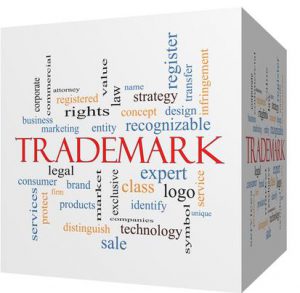
Registration of a trademark offers a better legal protection while during infringement.
It is strongly advisable that before making an application for registration make an inspection of the trademark to ensure that such application of the registration should not be denied due to the resemblance of a proposed mark with an existing one or a prohibited one.
Reasons for the refusal of registration are as follows:
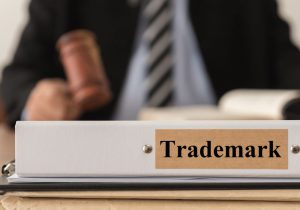
- The marks which are descriptive in nature relation to the applicant’s goods or services or a part of feature of the same may also be denied registration.
- A mark which comprises the common surnames or geographical terms may also be reduced.
- Refusal of trademarks may be with other relevant reasons as well.
Trademark registration term is 10 years. After the renewal, it can be possible for further period of 10 years.If the registered mark is not renewed after the period of 10 years, then it can be removed from the register of trademarks which is maintained by the registrar.
Anyone who claims the rights in a mark by registration can use the trademark or a service mark may use such designation to alert the public of his/her claim.
The registration symbol “R”, indicates that the mark is registered. It cannot be used if the mark has not been registered.Under trademarks law, section 135 provides both infringement as well as an action of passing off.
Trademark infringement and remedies:

The infringement of the trademark involves the violation of the exclusive rights which are attached to the registered trademark without any due permission of the trademark or the involved licensees, provided that such permission was granted within the scope of the license.
Infringement occurs with two main reasons:
- The infringer uses a trademark which is identical to a registered trademark owned by another person.
- Infringer uses a trademark which is confusingly similar to such mark.
The owner of the registered trademark may proceed legally against that infringer.
Infringement proceedings:
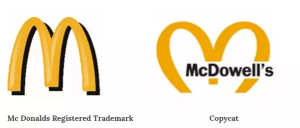
Infringement proceedings cannot be brought for a mark which is not registered, as it cannot be infringed as such.
The brand owner can instead commence proceedings under the common law for an action of passing off or misrepresentation or under the legislation which prohibits unfair business practices.
The trade dress infringement can also be considered as “actionable” in some jurisdictions.
To establish the infringement of a registered trademark, it is enough to show that the infringing mark is identical or deceptively similar to the registered mark. There is no further proof requirement.
The following remedies are available to the owner of the trademark for an unauthorized use of its imitation by a third party:
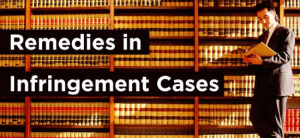
- An action for infringement will be taken in the case of registered trademark.
- An action for passing off will be taken in case of unregistered trademarks.
Both the above mentioned things are different from each other. Statutory remedy will be given in case of infringement and for passing off, the remedy will be provided by a common law.
When infringing or passing off of a trademark occurs, even the criminal complaint can also be filed. The offences under the provisions of the trademarks act, 1999 cognizable and hence the police has the power to register an FIR and prosecute the offenders directly.
Following are some of the civil remedies in the trademark:
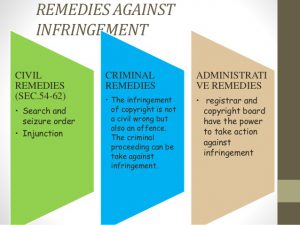
- Damages can be claimed;
- Injunction/stay against the use of the trademark;
- Appointment of local commissioner by the court for custody or sealing of infringing material or accounts;
- Accounts and handing over of profits;
- Application under 39 rule 1 and 2 of the Code of Civil Procedure (CPC) for grant of temporary/ad interim-ex parte injunction.
The courts may grant the injunction and also direct the relevant authorities to hold back the infringing material or its shipment or it may suppress the disposal in any other manner in order to protect the interest of the owners of the relevant intellectual property rights.
The court may grant relief in the form of

- Temporary injunction
- Permanent injunction
- Interim injunction
- Damages
- Delivery of the infringing goods for destruction
- Cost of the legal proceedings
- Account of profits
An ex-parte decree may be passed in case of interim injunction or it may be passed after notice.
The interim reliefs (grant of order for short term help) in the suit may also include the order for:
- Appointment of a local commissioner which is akin to an “Anton Pillar Order” for search, seizure, account books, preservation of infringing goods and preparation of inventory etc.
(Anton Pillar Order – A court order which requires the defendant to permit the plaintiff or their legal representative enter into the defendant’s premises to obtain the legal evidences for that case.)
- Restrain the infringer from disposing or dealing with the assets in a manner that adversely affects the plaintiff’s ability to recover the damages, costs or other pecuniary remedies which finally awarded to the plaintiff.
Passing off:

“No one has the right to represent his goods as goods of someone else”, this is the ultimate law procedure in intellectual property rights.
- In simple, if a person sells his goods as the goods of another, then the particular trademark owner can take the legal proceedings against him. This becomes a case of passing off.
- This is actually to protect the goodwill which is attached with the unregistered trademark.
- It should be offensive for a trader to misrepresent his goods or services as those of another and as a result it deceives the consumers for purchasing such goods or services by visualizing in their minds as they were purchasing the same goods.
Passing off has been applied broadly to cover things of a great diversity such as
- Similarities between the packaging of products;
- Protect the product trade dress;
It is totally different or distinct from the registered trademark, but often it sits together with the law of registered trademarks. For a passing off action, there is no necessity that the trademark needs to be a registered one.
There are three essential elements to consider for passing off:
- First and foremost thing is that show the trademark, trade dress or whatever thing it has, goodwill or status. Passing off cannot be used to safeguard the mark if it is new or with little status or no trade has taken place.
- It is mandate to show that misrepresentation has arisen or it’s likely to arise. These necessities that a trademark complained of must be adequately similar to the trademark of the applicant for a customer to be misled.
- Finally, there may have some possibilities of damages as a result of deception.
These above mentioned elements must be proved with the relevant proofs, so that an action of passing off carries a evidential burden, but it provides a possible remedies when,
If there has been obvious copying of trade dress or when a trademark has not been registered but has a considerable standard and the usage.
Trademark Registration process can be completed within the specified duration of time and at an affordable cost. Our highly experienced professionals are there to guide and support you throughout the registration process. Efficient and a reliable services will be provided based on the client’s requirements.
For more details -> Solubilis Corporate Services.